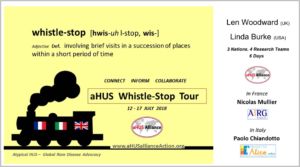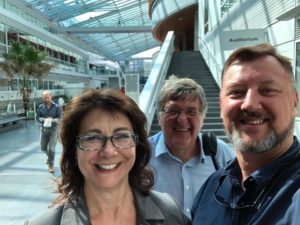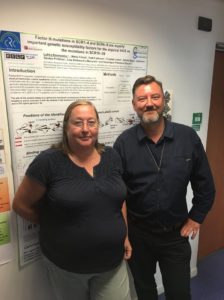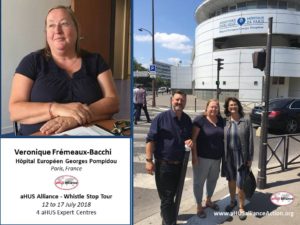
With the nearby Eiffel Tower in view as we entered the Hopital Europeen Georges Pompidou (HEGP) the alliance began it Study Tour of aHUS Expert Centres.
It was fitting that the tour began in HEGP because it was here in June 2012 where some aHUS patient organisations from Belgium, France Spain, and UK met each other for the first time at a French aHUS Patient Conference hosted by Nicolas Mullier of AIRG France. On the balcony of the Auditorium pictured below these organisations began talking about forming “some kind of alliance”.

This visit however was to the aHUS Expert Centre at HEGP.
The Complement Diagnostics Laboratory led by Dr Veronique Fremeaux- Bacchi is located here.
Veronique has over 25 years’ experience of the genetic study of aHUS. From her medical student days, she has had a passionate professional interest in the genetics of aHUS and was the first to find an aHUS predisposing mutation Complement Factor I. Véronique also discovered a mutation in DGKE which explained its role as a cause of aHUS. She has had over 150 research articles published about aHUS alone , but always in collaboration with National and International investigators. There is no doubt she has considerable professional expertise on the subject of aHUS.

The Laboratory has been built up over the years as a part of the Department of Immunology at HEGP and its activities include both a diagnostic service and research into Complement mediated diseases and aHUS takes up a large part of the Laboratory’s time.
It is the sole service centre for Complement diagnostics in France and according to patient group representative Nicolas Mullier its work is well known and respected.
Around 60 patients’ blood samples arrive each day from doctors around France who suspect , or wish to seek confirmation that some Complement abnormality is happening in their patients.Between 40 to 50 of them will turn to be affected by aHUS.
On arrival the samples enter a systematic process which tracks them until the results are known. Each is registered, stored at cold temperatures, passed to technicians who put them through ory the Illunura equipment which tests them for known mutation in the panel CFH, CFI, MCP, C3, CFB, Thrombomodulin, DGKE ,C5 . The Laboratory searches for new mutations. The output from the tests are then examined and analysed before finally a patient specific advice is written and signed off by Veronique. Throughout the process there is a vigorous quality control , and both used and contaminated vials are recorded before destruction. The laboratory also a team of five qualified and post graduate student staff undertaking these tasks .
Veronique’s office has files relating to all the patients that have had genetic testing by her Laboratory including the document recording the test results revealing the first CFI mutation found.
Although under the treatment protocol established in France she has no direct contact with patients she knows much about the patients and the care they need based on the advice she provides from their genetic results. She has a steady flow of detailed personalised feedback reports to write to the doctors requesting the genetic tests
She regularly visits local aHUS treatment centres around France to establish good working relationships and share information about genetics and news about latest aHUS research.
However, although it is a centre of excellence in its own field, it is revealing that the Laboratory, because it is not in direct contact with patients, and is not regarded as a Reference Centre under the ERKNET classification.
However, the Laboratory is represented in the French aHUS Network groups. Working with other eminent and well-known aHUS researchers Professors Julian Zuber (Transplant) Fadi Fakhouri (Nephrologist) and Chantal Loirat (Paediatrician) in the “Group of 4” , a multidisciplinary team, and in turn rippling out in concentric circles to with two other networks the “Group of 20” and “100” to establish French aHUS carer guidelines.
French patients access to eculizumab is set out in a protocol which allows children to be prescribed it locally within 2 to 3 days of a suspicion of aHUS and adults within 5 days. Initial prescription is not dependent on genetic testing , and so the Laboratory has time to do its work, but in practice would take only days to provide their findings and advice.
Inevitably the Laboratory has established a French Registry of all predeposing mutations in patients who have had Complement genetic testing including all those with aHUS.It also collaborates with other international Registries and has supplied data of significant variants ( mutations) it has found to the University College of London database of all complement mutations.
The topic of aHUS genetic testing features in the aHUS Patients Agenda as it matters to patients beyond the diagnosis and treatment management , into the impact on close and wider related family members and the dilemma of knowing or not whether personal presisposition exists. It is an issue that the alliance would like to address in more depth some time in the future and Veronique ,who is very cognisant of this issue, is someone we could turn to for advice.
At the end of the visit the alliance delegates had learned much about this type of aHUS expert centre ,and were beginning to understand some of the differences there may be as well as common themes and characteristics with other centres which may be termed aHUS centres of expertise.
The alliance appreciated the time that Veronique and her team gave to the visit , and also appreciates the benefit the Laboratory provides ,not only to French aHUS patients, but also to the global aHUS community for its past as well as its ongoing research.
( For next stop click here)

Whistle-Stop Tour of 4 aHUS Centers in the EU: Visits to Three Nations in 6 days
1st Stop: Paris FRANCE
2nd Stop: Newcastle upon Tyne ENGLAND (UK)
3rd Stop: Bergamo ITALY
4th Stop: Milan ITALY

